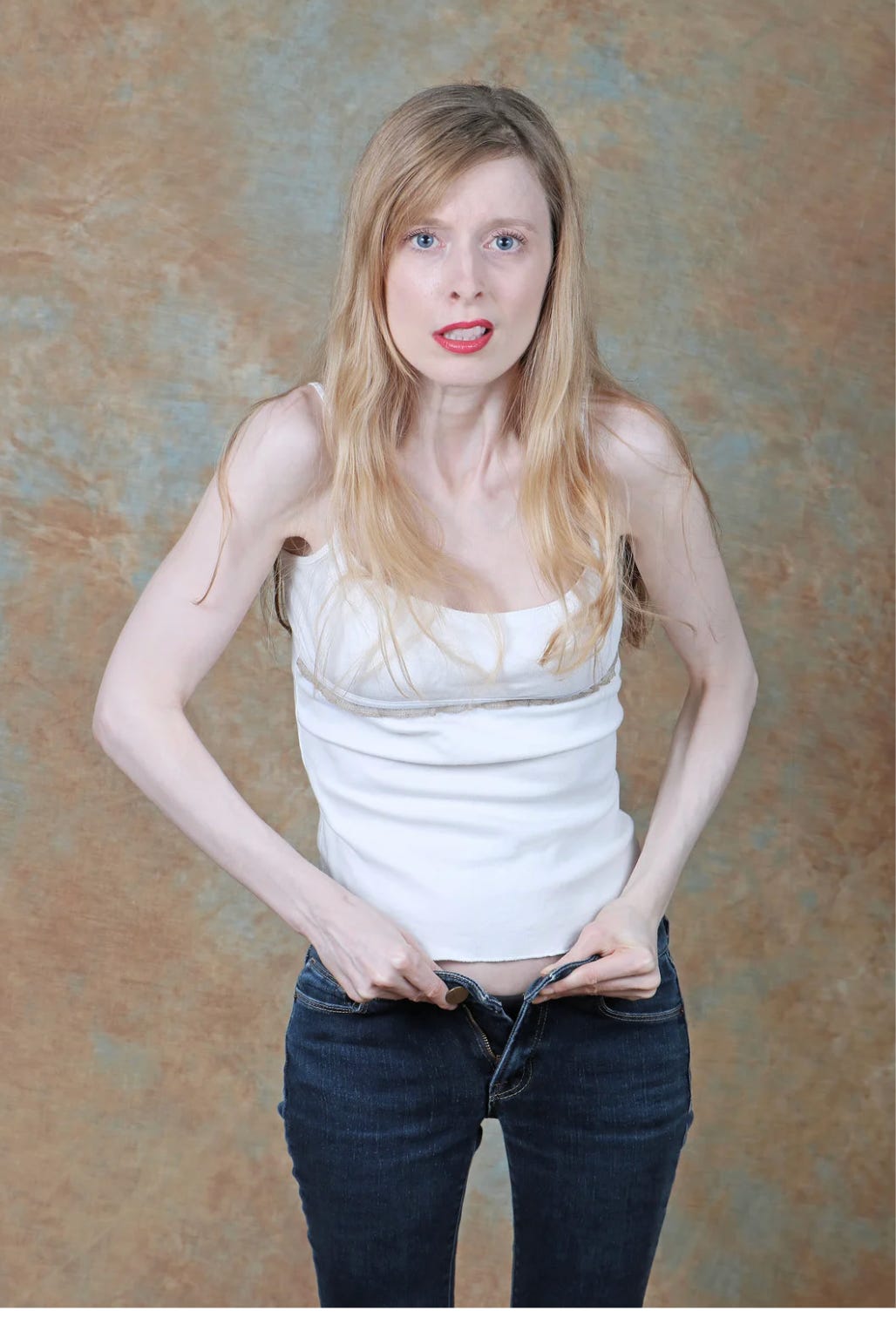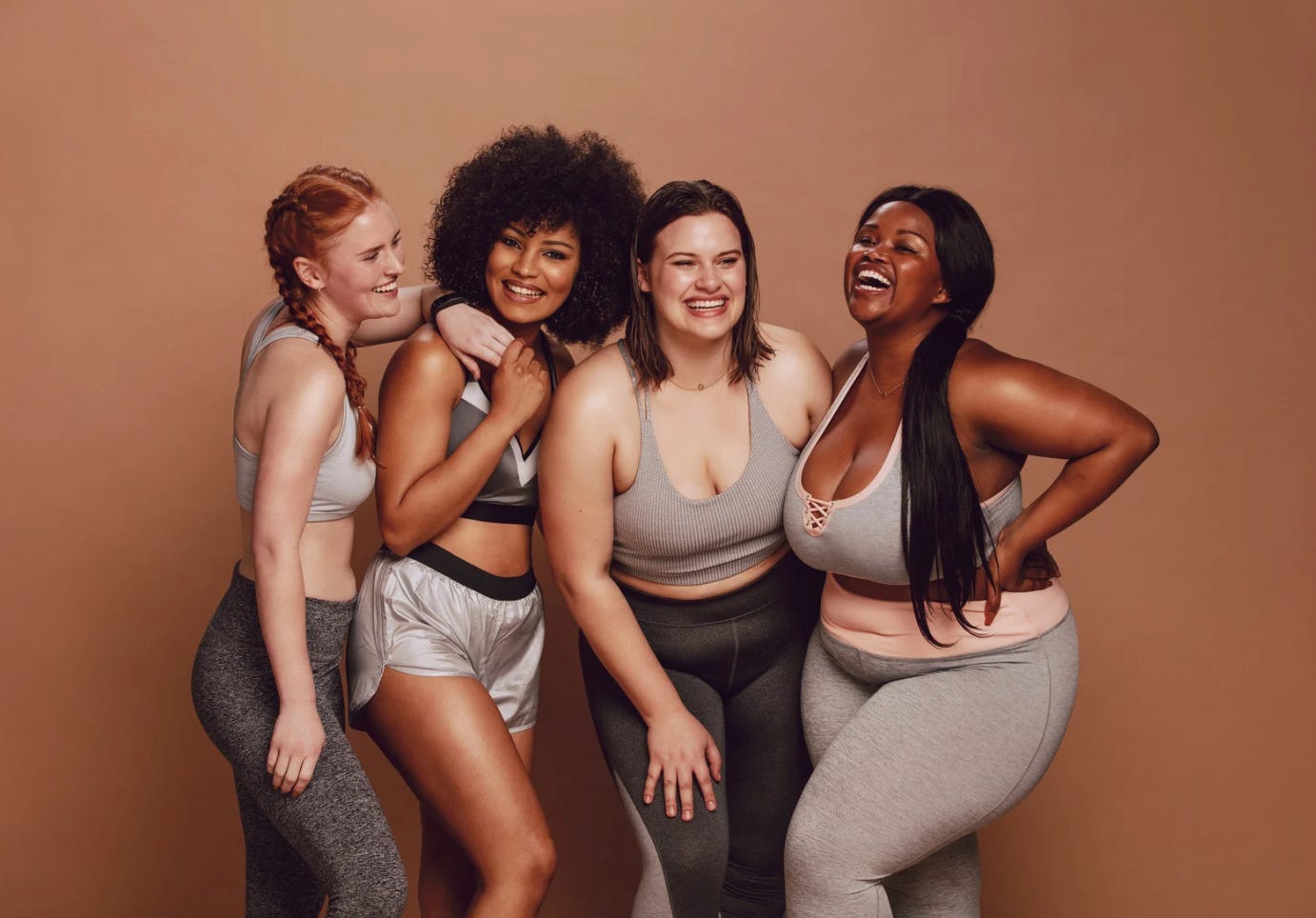“You Would Not Have Survived the 2000s”: A Pink Zone Warning From Millennials
On the Retrograde Return of #Y2KSkinny
Based on: “Traumatized millennials sound the alarm as Gen Z’s ‘dangerous’ #Y2KSkinny diet trend takes over TikTok” – New York Post, July 10, 2025
Read the article
TikTok is having its skinny moment.
And it’s not just sparking nostalgia—it’s triggering a kind of communal nervous system flare-up for Millennials who lived through the first wave. As a Gen X woman, I remember it too. I watched the cultural famine unfold from just upstream — and now I watch it trying to re-enter the current.
There has been a surge of teens and women in their early 20s romanticizing what they are calling “Y2K skinny” bodies, and referencing a version of thinness that once ruled magazine covers in the late 90’s and early aughts. The “look” that nearly destroyed a generation of women.
In a time when clavicles are being flaunted like accessories, thigh gaps measured like metrics, and the gaunt aesthetic is making its way back into digital consciousness, women who survived the last cultural famine are speaking out—not for clout, but for care.
This is Pink Zone territory.
Because here’s the truth: when women warn each other across time, it’s not trend commentary. It’s trauma alchemy. It’s survival skills being passed down like medicine.
Millennial women — many of whom came of age watching Lindsay Lohan, Nicole Richie, and Kate Moss disappear before their eyes — are raising their voices. Not out of superiority. Out of hard-won wisdom. Out of a sacred obligation to say:
Don’t go back.
Creators in their late 30s and 40s have been prompted to come forward and trauma share in hopes of preventing Gen Z and Gen A from repeating the past.
Creator Kaila Uli (@kailauli) said it best in a viral reel that now feels like a feminist siren:
“So many people say they're Y2K skinny and using this as a way to body-shame other people, but you guys don't understand what you are calling Y2K skinny. Within the Y2K, it’s been called fat… We need to not forget that 2000 skinny was underfed… Mama, you would not have survived the 2000s.”
— Kaila Uli (@kailauli on Instagram)
Part PSA, part big sister tough love, part war story — her post hit a nerve. Because it’s not just about what it looked like. It’s about what it cost.
Uli, who modeled during the aughts, recalls being sent home from shoots for being “too fat” — even when she was rail-thin. Her reminiscent message, and others like it, are flooding social channels right now. A growing chorus of women naming the harm out loud. Naming what they once internalized.
Many of us remember the 2000’s era:
The pop culture cruelty of “heroin chic.”
Lindsay Lohan, Nicole Richie, and Kate Moss were all so thin it hurt to look at them.
Kate Moss's infamous “Nothing tastes as good as skinny feels.” Though, she’s since distanced herself from the phrase, for many women, its cultural (and personal) damage remains.
Richie has spoken publicly about her health struggles in the aftermath of that time, as has Lohan.
Looking back, it wasn’t just fashion. It was a famine of self-worth.
And yet — in 2025 — it’s creeping back. Under the guise of “aesthetic.” With nostalgic filters and innocent hashtags. Which is why this is a Dispatch from the Pink Zones.
We don’t gatekeep this knowledge. We offer it with open hands.
Because what Gen Z and Gen Alpha are reaching for isn’t always thinness — it’s belonging. It’s agency. It’s identity. But when those things get wrapped up in shrinking ourselves? That’s when the alarm bells ring.
Some creators are warning younger women what the #Y2KSkinny body actually took:
Disordered eating.
Diet pills and cigarettes.
Shame.
Loneliness.
Hospital visits dressed up as glamour.
You may also remember Jessica Simpson’s so-called “fat” moment when the 2009 photo where she wore high-waisted jeans, a leopard belt, and a black tank launched a thousand body-shaming headlines. Looking at it now, she looks strong, healthy and radiant. But at the time, she was called fat on national television and in the glossy pages of gossip magazines
The truth is: the reason Beyoncé and J.Lo are celebrated as beautiful now has everything to do with the cultural work Millennials and Gen X women have done to reject the starvation scripts. To write new ones. To reclaim curves, softness and strength. To let bodies change — and still be worthy.
Today, shows like Michelle Buteau’s Survival of the Thickest celebrate full-bodied joy, love, and style without apology. There are more shapes on screens than ever before, and, yet, the pull to restrict, shrink, and disappear is showing signs of returning.
Even artists once celebrated for body positivity are navigating the complexity of society feeling like artists bodies should be open to public commentary. Recently, Meghan Trainor revised the lyrics to her hit “All About That Bass,” swapping the line “I ain’t no size two” with “I got some new boobs.” The update came alongside her public admission that she’s been using a GLP-1 drug. Fans had mixed reactions — some applauded her evolution and transparency, while others felt betrayed by what seemed like a departure from her original message of size acceptance. The complexity of it all is peak 2025 — and part of the conversation too.
Which is why this moment matters.
Because we don’t just want to look well. We want to be well.
Let’s be clear:
“Strong” is a far better marker of health and longevity than “skinny” ever was.
Muscle mass, especially in women 35+, is protective.
It’s resistance against not just osteoporosis or injury — but against the invisible forces asking us to disappear.
It’s not just personal. It’s ancestral.
The Pink Zones are not about aesthetics. They are about vitality. Intergenerational care. Nervous system regulation. Thriving over shrinking. Muscle over fragility. Nourishment over negation.
The same cultural current that’s reviving “Y2K skinny” is also flooding timelines with anti-aging hacks, injectables, and biohacking regimens — all promising to freeze women in time.
It’s not just about thinness anymore. It’s about resisting any visible sign of maturity, change, or lived experience.
But in Pink Zones, we know: aging isn’t something to fear. It’s a privilege. A body that changes is a body that’s alive.
As 81 year old writer Melinda Blau said,
“When I’m told, ‘You look good for your age,’
I correct the observer by saying,
‘I live good for my age.’”
— Melinda Blau, quoted in the fabulous [B]old Age by Debbie Weil
We’re not here to look young OR disappear.
We’re here to live well — out loud, out front, IN our bodies, without apology.
And yet, like a skinny-scary ghost, another flashback from the fashion past may be appearing on a screen near you:
Do you recall Rachel Zoe? She’s the stylist credited (or blamed) for curating the skinny aesthetic of boho heroin-chic, styling starlets into ghost versions of themselves.
Now in 2025, she is eerily re-emerging on Real Housewives.
Many worry the architect is back in the building, but are hoping she, too, has grown and learned from the past
Because when millennial women speak now about Y2KSkinny, it’s not from superiority. It’s from survival.
It’s not for clout. It’s for continuity.
This isn’t a trend.
This is a warning flare from the women who made it through to a different zone.
Because of the work millennial women have done over the past 15 years to eradicate the scary skinnies from the zeitgeist, they’re sounding the alarm as they see it creep back up. #NeverForget.
This is what makes it a Pink Zone moment: a zone of lived wisdom, of care passed between generations, and of women trying to protect each other.
It’s not a trend. It never was.
It’s a warning.
It’s firm, fervent, and — in my opinion — very PINK.
Let’s Talk:
Did you survive the Y2K Skinny years?
What wisdom would you offer to someone feeling the pull toward that aesthetic now?
What’s your current relationship to strength, softness, or shape?







This is a great article, Heidi. I did not know this was going on. This really resonated with me, "Because what Gen Z and Gen Alpha are reaching for isn’t always thinness — it’s belonging. It’s agency. It’s identity. But when those things get wrapped up in shrinking ourselves? That’s when the alarm bells ring."
Thanks so much for sharing this Heidi. I remember my bulimic early 20s and my obsessive exercise 30s. By my forties I had begun to accept my body and make friends with ALL the foods and moderate exercise. Anyway - I wish my younger sisters embrace their natural body.